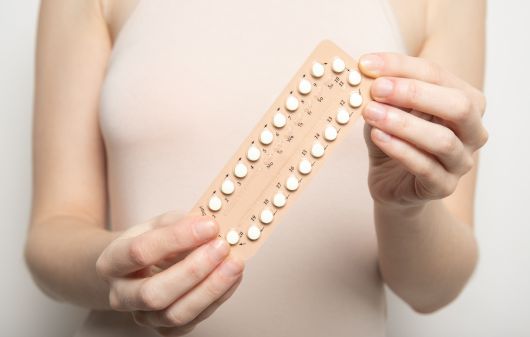
Get birth control prescription online
There are various contraceptives and birth control methods for men and women as per their needs, age, affordability, and safety.
If you want a prescription for a suitable contraceptive, consult our doctors at Your Doctors Online. It is an easy-to-use app to get birth control pills virtually and get a consultation and prescription within minutes.
How to connect with birth control doctor?
Connect with a health care professional online in 3 easy steps.
1
Describe your issue
Download our app, register and tell us about your medical issue to get started.
- Birth Control
- Anemia
- STD
- UTI
- Skin
- Covid
2
Chat with a doctor
Connect with a board-certified doctor. You can chat, send pictures and videos.
Hi Dr. Nicole, I need a prescription for contraceptives. Can you please help?
3
Get online prescription
Our Online doctors can help you with your medical issues and give you prescriptions.
Prescription
- Yasmin (Ethinyl estradiol 0.03mg and drospirenone 3mg) Tablet
- Take once a day for 28 days same time every day.
Send Prescription
How and what type of birth control pills can I get?
You can connect with an online healthcare provider for the consultation. After a careful diagnosis, your healthcare provider will tell you the best and best-suited birth control prescription option for you.
Here is the list of birth control medications you can get by connecting with our virtual healthcare providers:
- Morning-after pills: Used after unprotected sex to prevent pregnancy, e.g., levonorgestrel.
- Birth control pills: They contain progestin and estrogen and are taken for three weeks after periods like Yaz.
- Skin patches: It is a contraceptive device containing hormones like estrogen and progestin like Xulane.
- Vaginal rings: It is placed inside the vagina and contains hormones like progestogen and estrogen-like NuvaRing.
Only your healthcare provider can determine the best and well-suited birth control option for you. It’s essential to get connected with your doctor for any birth control option.

Birth control prescription medications we prescribe
birth control
Learn MoreFAQs about birth control online prescription
How do I use the different types of birth control pills?
Only a healthcare professional or pharmacist can determine the best birth control pills for you as per your needs. Getting medical consultation and diagnosis is beneficial to get a clear understanding of your needs for birth control pills and follow the prescribed guidelines.
What is the #1 most effective form of birth control?
The best birth control options include IUDs and implants for long-term effectiveness. Other methods like pills, shots, or vaginal rings can also be reliable when used correctly.
How can I request birth control from an online doctor?
You can get birth control pills by connecting with an online doctor through our easy-to-use app.
What conditions are treated with birth control?
With birth control pills, you can prevent pregnancy and treat specific disorders like polycystic ovarian syndrome (PCOS), which causes hormonal imbalance and drastic bodily changes, including severe acne and facial hair growth. Moreover, it can treat menstrual cycle issues like PMS and PMDD helping resolve the problems of irregular periods and abdominal pain during PMS or PMDD, and even reduce the risk of contracting ovarian cancer.
How to get a birth control prescription without going to the doctor?
Yes, you can get a prescription for birth control pills without physically attending the doctor. Instead, you can get the prescription online from your home at a trusted clinic like Your Doctors Online.
Are there over-the-counter birth control pills?
Yes, the first OTC birth control pill approved by the FDA is Ophill. It is a progestin-only pill with fewer side effects than combination pills containing both progestin and estrogen. Combination pills have side effects like stroke or blood clot formation.
Which birth control method needs a doctor's prescription?
Some birth control methods, like condoms and spermicides, don’t need a prescription and are available in most drugstores. However, they are single-use products used during or before intercourse to prevent pregnancy. You will need a doctor's prescription for long-term methods, like pills or vaginal rings or patches.
Do I need a doctor's appointment to get the pill?
Yes, you need a doctor's appointment, but the good news is you don’t need to attend physically. Instead, you can consult virtually. Due to various birth control options as per different health conditions, women are associated with, you need to consult a doctor to see what works for you. Then your doctor can prescribe you a suitable birth control pill.
Can a gynacologist prescribe birth control without an exam?
It is essential to get a consultation, but you don’t always need to get a physical pelvic exam and can consult online for the prescription of birth control that is suitable for you. If you are looking for appropriate birth control, consult a doctor at Your Doctors Online for the prescription of a contraceptive without an exam.
Does birth control make you gain weight?
Some birth control options have a side effect of fluid retention, which is temporary. However, it doesn’t make women gain weight, which is also verified by the studies.
What is the best birth control without the pill?
The most effective birth control options without the pill are implants and intrauterine devices (IUDs). These are also known as long-acting reversible contraception (LARC). These options also help with period flow and cramps.
Is it safe to get birth control online?
Yes, our doctors at Your Doctors Online provide safe and practical advice on using birth control via virtual visits. Our company strictly follows HIPAA-compliant healthcare policies and ensures doctor-patient data confidentiality.
-Phindile Mkhatshwa
-brooke snow
-Okiti Stephanie
-ASIF Khan
-Chelsey
-edith bien aime
-Lesego Thejane
-Stephanie Brown
-kulwinder gill
-Elijah Mark
Get started today
Talk to online doctors now and get medical advice, online prescriptions, refills, lab requisitions and medical notes within minutes. On-demand healthcare services at your fingertips.





